Rubin: A WWII footlocker appears after 80 years — but mystery remains
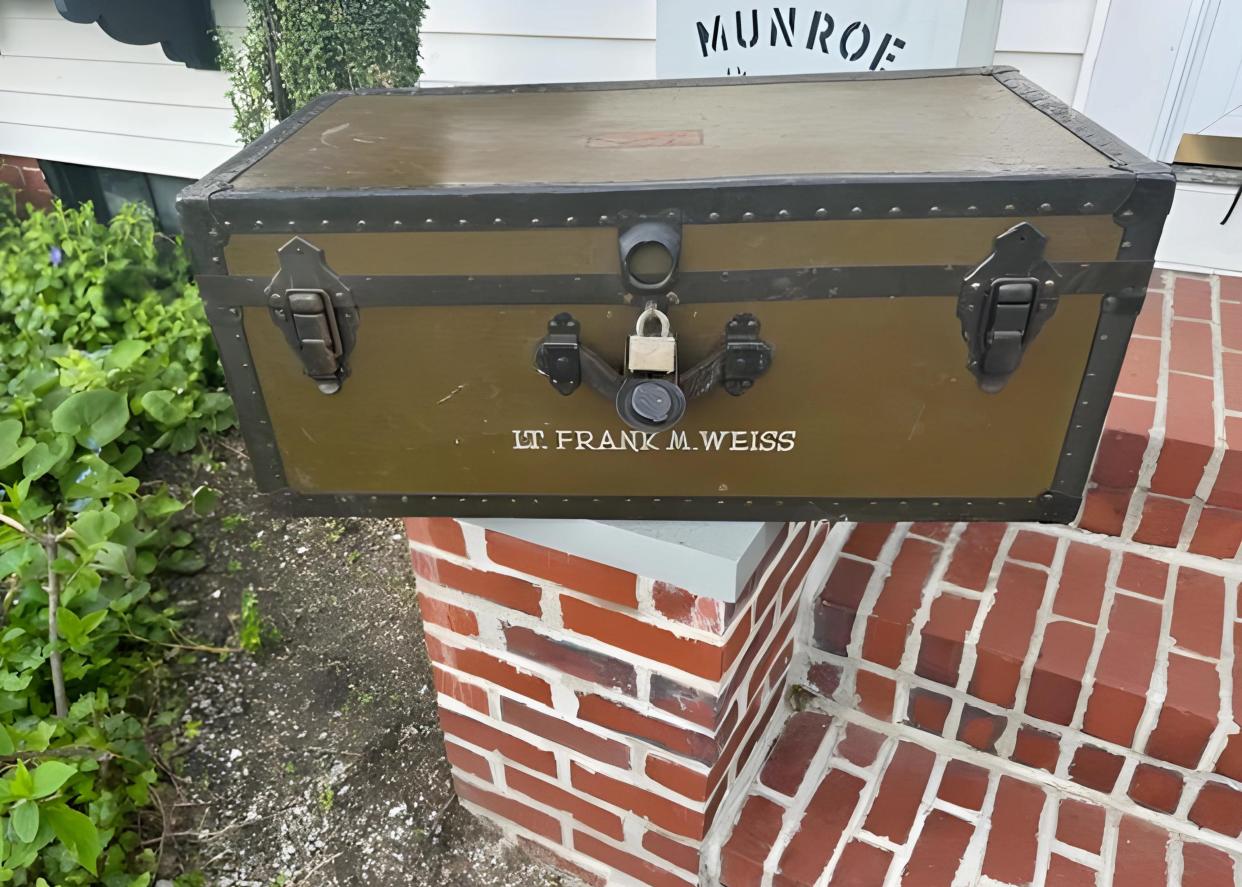
The FedEx guy was on Michael Shannon's porch in northwest Detroit, and he had an issue. "We're not supposed to take things without a box," he said.
Shannon pointed to the item at his feet − 31 inches wide by 16 inches deep by 13 inches tall, olive green in color, one of millions of sturdy objects of its kind to survive far worse than a few hours on a modern jet.
"It is the box," he said.
Specifically, it's a U.S. Army Air Forces footlocker, made of wood and reinforced with metal at its edges. Eighty years ago, as World War II raged overseas, it held the few possessions of 2nd Lt. Frank M. Weiss of Detroit.
Rediscovered by Shannon at a curb on trash day in late April, it has been safely relocated to a basement in Pawtucket, Rhode Island, where Weiss' son has packed it with wartime memorabilia and the flag from his father's funeral.
It's a receptacle, though, for more than that.
A story, to start with, the tale of how it spent at least six decades in a stranger's garage and only found its way home after someone finally decided to throw it away.
A reminder, in an angry world, that simple kindness can still be a motivator for people to go above and beyond the call of duty when the only likely reward is inconvenience.
A dividend, in Shannon's case, for endless curiosity and an appreciation of the past.
The path of the fiberboard chest touches on white flight, the 1967 riot and even the Purple Gang, if you go back far enough.
There's a mystery to it − how did the footlocker find its way to the garage where it sat protected for so long? − and to Shannon, there's an element of spirituality. A lot of stars had to align before Weiss' son could take possession of an artifact he didn't even know existed, and playing a role in destiny seemed far more worthy than making a few dollars that would only disappear.
As for how it made the trek from Shannon's house on Appoline Street to Herb Weiss' home in Pawtucket, that just took a yank and a drive.
He hefted it into the bed of his 2016 Dodge Ram 1500 and drove it to a FedEx store in Southfield. Weiss had prepaid the $160 fee, and a shipping clerk agreed that yes, indeed, it was a box.
Fate and fortune
Shannon's late parents bought the Appoline house in 1968. White flight from Detroit had begun in the 1950s, but the 1967 riot accelerated the process, and a transitioning Jewish neighborhood became both attainable and affordable.
The area remained sedate enough that Shannon, 55, knew weatherman Sonny Eliot's mom, who stayed put across the street, and it's comfortable enough that he can still find small treasures in other people's castoffs. Alongside the black pickup in his garage, he has a couple of lawnmowers, a small generator and a snow blower, each needing only a spark plug or a few tweaks to be up and running.
"He's a curious person," said 98-year-old neighbor Elva Gamble, enjoying a bit of sunshine on her porch. "He's always digging up something."

"People throw away anything," Shannon said, and not that he's scavenging, but sometimes he can't help but notice.
Retired from the city wastewater plant, he does small repair jobs for friends of friends − windows, decks, what have you. He can't recall what he was returning from when he turned onto a street that's not usually part of his route home, but that's when he saw a man pushing a wheelbarrow with the empty footlocker in it.
If he'd made his regular turn, Shannon said, he'd have missed it. A few seconds earlier, the same. A few seconds later, he might not have glanced in that direction.
He pulled over, and immediately took note of the name painted in white on the front of the locker: "LT. FRANK M. WEISS."
The letters were brushed, not stenciled. "Bomber art," the history devotee called it, like the illustration on the nose cone of a B-17. That was enough for him to snap a cell phone picture and dial retired Detroit schoolteacher Cetaura Bell.
She's his next-door neighbor, his girlfriend, and the daughter of a devoted flea market entrepreneur.
"I was like, 'Get it! Do not dare put that in the trash,' " Bell said.
By the time he made it to her house − one long block, two short ones − she had found both Weisses online.
Deep roots in Detroit
Frank M. Weiss was born in Philadelphia in 1914 and moved to Detroit with his family the next year.
He was named Morris F. Weiss then, and still named Morris in the 1920 census records that Detroit Public Library archivist Laura Kennedy turned up as she helped Herb Weiss reassure himself that the footlocker was in fact an heirloom.
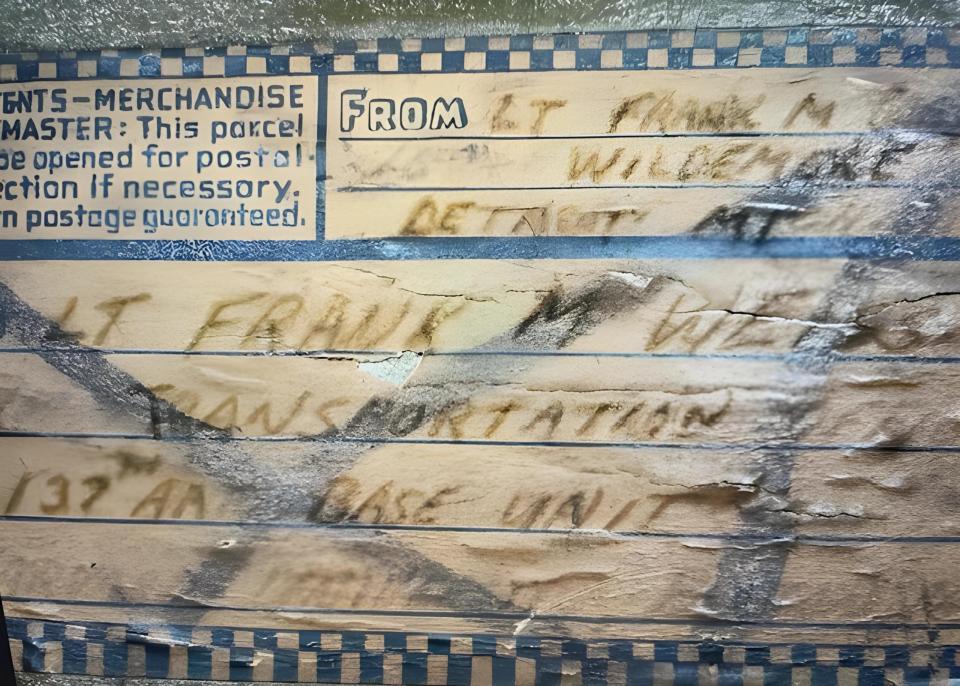
By the time he met Sally Weller, he was Frank, and he took her to the London Chop House on their first date in August 1941. Given the prices of the entrees, he said later, he was pleased that she finished her lamb chops rather than just take a few dainty bites.
Her father was Samuel Weller, a well known defense attorney whose clientele purportedly included members of the Purple Gang. When Weiss asked permission to propose to his daughter, just six weeks after the lamb chops, Weller had only one question: "Were you ever in jail?"
The Weisses began their 62-year marriage in January 1942 at the Book Cadillac Hotel, as classic a Detroit location as the Chop House. Weiss was working for Winkelman's, the department store chain, and climbing briskly up the corporate ladder.
Then the U.S. Army suggested a career change.
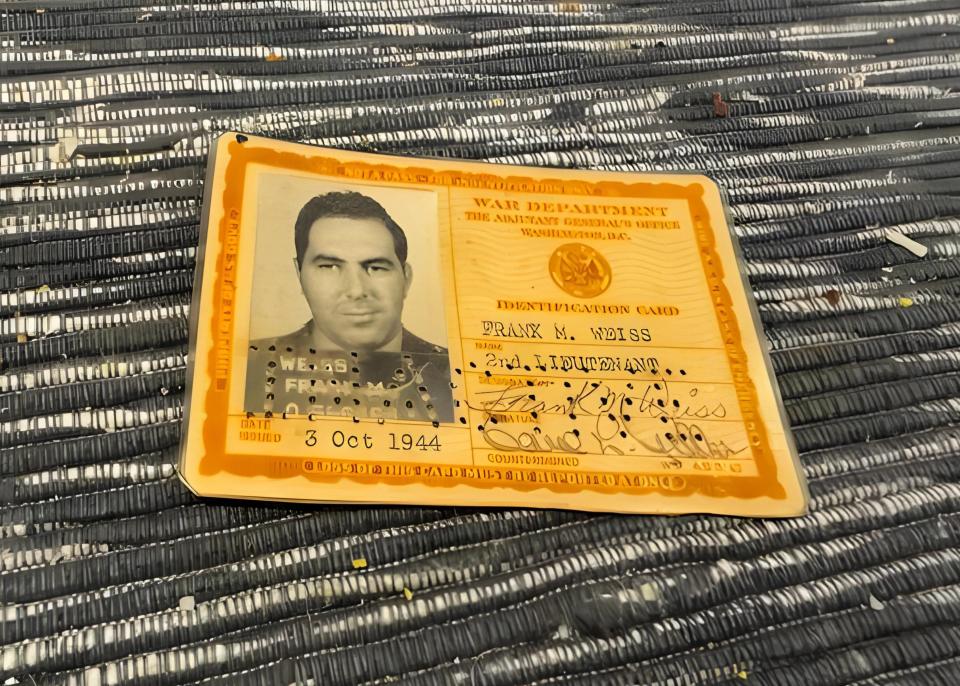
Where duty called
More than 16 million Americans served in the military in World War II. Not all of them came ashore at Omaha Beach or flew dangerous spy missions in the Pacific.
Frank Weiss spent his war stateside, going where he was assigned and doing what he was told. Kearns, Utah, at an air base with no runways. St. Louis, Missouri. Denver. Miami Beach. At one point the Army Air Forces, which had yet to split into a separate service, had him studying meteorology. Later, it was statistics.
He rarely spoke of those years, Herb said, but he had some scrapbooks full of photos and some assorted paperwork and letters of recommendation issued by superiors as he made the climb from private to commissioned officer.
Herb kept them in his basement in a red Nieman Marcus box. Then a message popped up on Facebook about a trunk.
Herb, 70, serves as deputy director of a senior center in Pawtucket and writes freelance articles for several local newspapers about issues tied to aging. He dedicated one of the pieces to his father, and that's what Bell found on the internet.
After that, connecting the dots was easy. Tracking the steps of the footlocker has been more problematic.
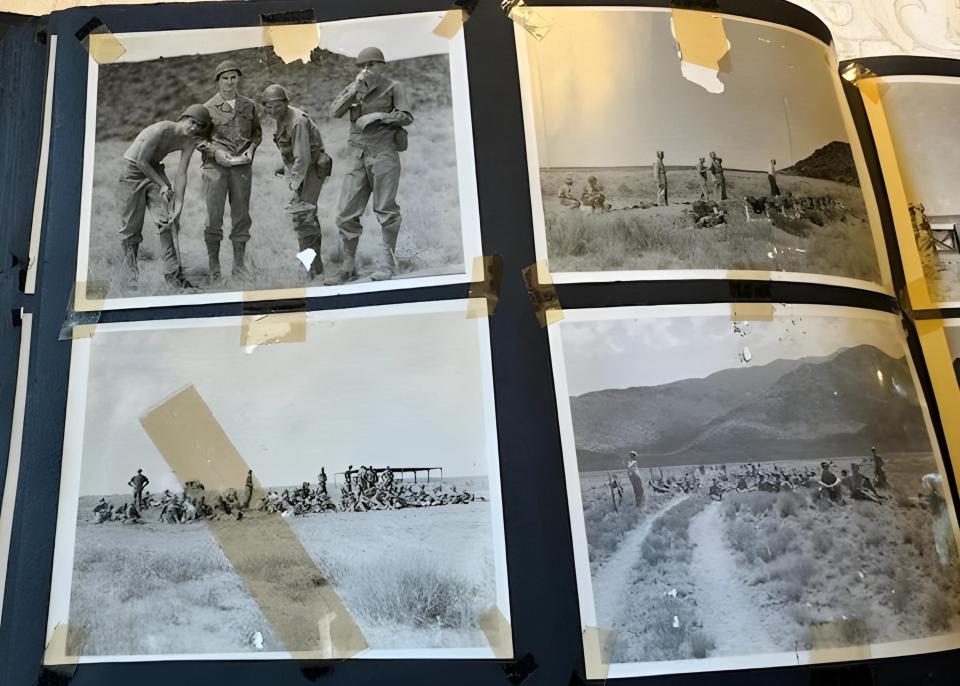
A tire, but no tracks
The man with the wheelbarrow was a friend of the elderly homeowner who had volunteered to clear out her garage. It appears, Shannon said, that the footlocker came with the house when she bought it in 1965, almost 60 years ago.
Frank Weiss had returned home to his wife and oldest child after the war. In the early 1950s, at the behest of Winkelman's, the family moved to Saginaw. Ultimately he took an executive job at a women's clothing chain in Dallas, where Herb was raised.
But at one point, his Detroit mailing address had been his in-laws' large house at 16841 Wildemere, the address that still shows in faint letters on a label on the trunk.
That's 3.8 miles from the corner where Shannon rescued the trunk, and there's no telling how it made the trip way back when Lyndon Johnson was president, or even earlier.
Herb wonders if his widowed grandmother − the wife of attorney Weller − held a garage sale before she joined her daughter's family in Texas. Maybe she hauled the footlocker to the curb, generations before someone else did the same thing.

One thing he knows for certain is that Shannon and Bell, to use an aquatic metaphor for an Air Forces footlocker, swam against the tide.
"They didn't have to do this," he said. They could have kept the trunk as a coffee table, or sold it at a swap meet; less pristine specimens are priced at more than $400 online.
"In this crazy world where people don't give a rip about each other," he said, "and certainly don't care about strangers, look at all the trouble they went to."
In insufficient thanks, he said, he sent Shannon a gift certificate to a favorite restaurant.
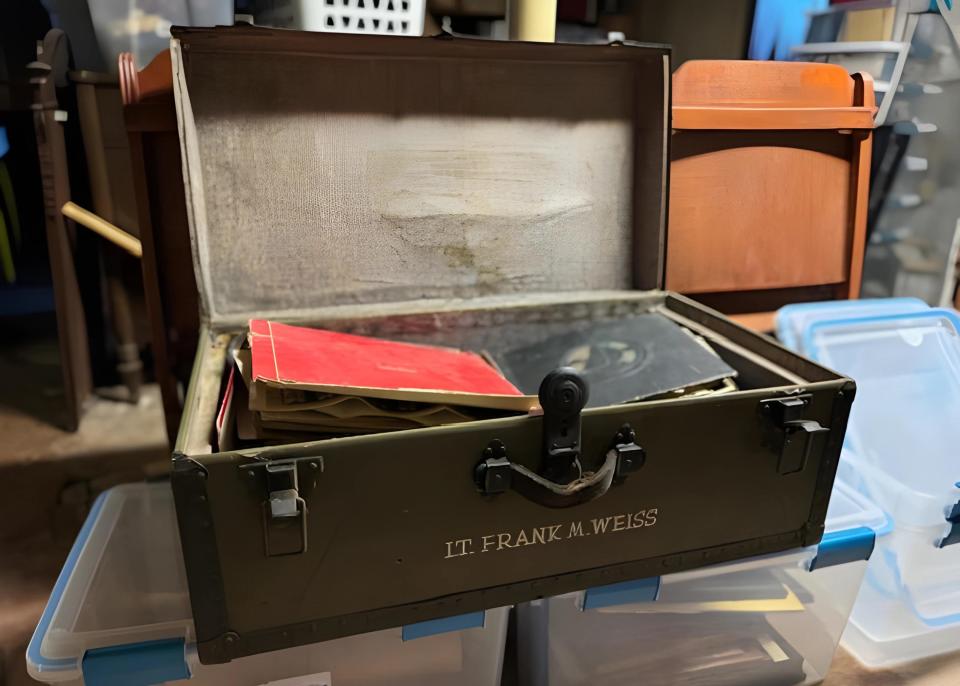
The footlocker, meantime, sits in his basement, safe and dry, atop some plastic tubs of other collectibles and next to three chairs salvaged from a historic Pawtucket theater demolished in 1997.
That was six years before Frank Weiss died in Dallas at 89, his old footlocker surely forgotten − but not, as it turned out, gone.
Reach Neal Rubin at NARubin@freepress.com.
To subscribe to the Free Press at discount rates, click here.
This article originally appeared on Detroit Free Press: WWII veteran's footlocker surfaces in Detroit after 80 years

